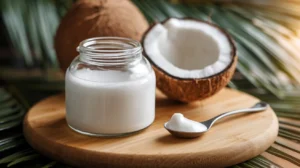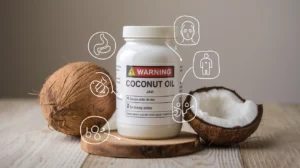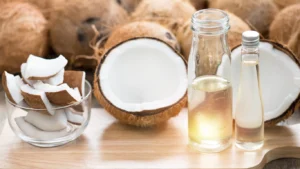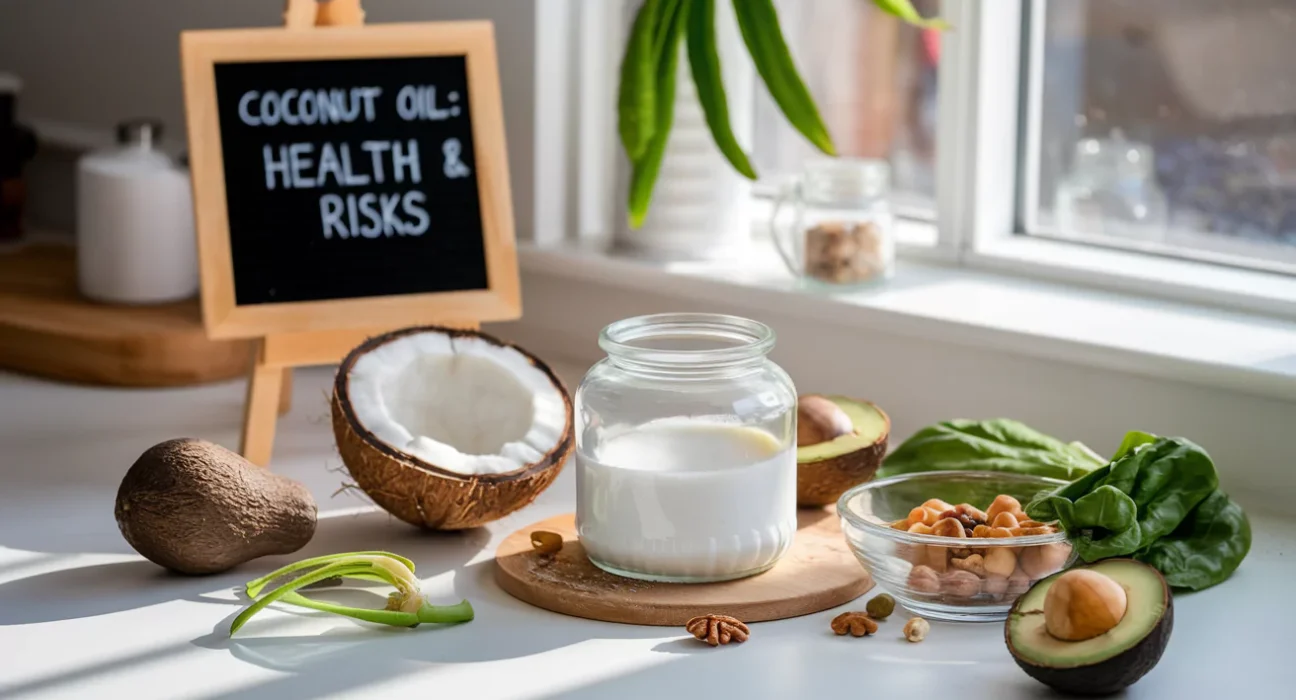Have you ever wondered if coconut oil is truly the miracle food it’s often touted to be? 🥥 I certainly did, and my journey to uncover the truth about this tropical oil has been an eye-opening experience. From hearing claims of it being a cure-all to warnings about its high saturated fat content, I found myself caught in a whirlwind of conflicting information.
That’s why I decided to dive deep into the world of this natural oil, sifting through scientific studies and expert opinions to separate fact from fiction. What I discovered was a complex picture of both potential benefits and risks. In this blog post, I’ll share my findings on the health gains and side effects of Virgin coconut oil, helping you make an informed decision about incorporating it into your lifestyle.
Join me as we explore the fascinating world of Edible oil, from understanding its composition to debunking common myths. We’ll uncover its potential health benefits, discuss possible side effects, and learn how to use it wisely in our diets. Whether you’re a Coconut extract enthusiast or a sceptic, I promise you’ll find valuable insights that might just change the way you view this controversial ingredient. Let’s get started!
1. Understanding Coconut Oil

A. Composition and nutritional profile
Coconut fat is primarily composed of saturated fats, with lauric acid being the most abundant. I’ve found that this unique fatty acid composition contributes to its health benefits. Here’s a breakdown of its nutritional profile:
| Nutrient | Amount per 100g |
|---|---|
| Calories | 862 |
| Total Fat | 100g |
| Saturated Fat | 82.5g |
| Monounsaturated Fat | 6.3g |
| Polyunsaturated Fat | 1.7g |
B. Types of coconut oil
I’ve come across various types of coconut oil in my research. The two main categories are refined and unrefined. Unrefined, or virgin coconut oil, is extracted from fresh coconut meat without chemicals or high heat. Refined this natural oil undergoes processing to remove impurities and has a more neutral taste.
2. Health Benefits of Coconut Oil

A. Heart health and cholesterol management
I’ve found that Virgin coconut oil can have positive effects on heart health and cholesterol management. While it contains saturated fats, these are predominantly medium-chain triglycerides (MCTS), which may raise HDL (good) cholesterol levels. Here’s a comparison of coconut oil with other common cooking oils:
| Oil Type | Saturated Fat (%) | MCTS (%) | Smoke Point (°F) |
|---|---|---|---|
| Coconut | 87 | 65 | 350 |
| Olive | 14 | 0 | 375 |
| Canola | 7 | 0 | 400 |
B. Weight loss and metabolism boost
In my experience, Edible oil can be beneficial for weight loss and boosting metabolism. The MCTS in coconut oil are easily digestible and may increase energy expenditure. However, it’s important to remember:
- Use coconut oil as part of a balanced diet
- Replace other fats with coconut oil, don’t add extra
- Combine with exercise for best results
3. Potential Side Effects and Risks

High calorie content and weight gain
I’ve discovered that coconut fat’s high calorie content can lead to weight gain if not consumed in moderation. One tablespoon contains about 120 calories, which can quickly add up. Here’s a comparison of calorie content in common cooking oils:
| Oil Type | Calories per Tablespoon |
|---|---|
| Coconut | 120 |
| Olive | 119 |
| Canola | 124 |
Increased LDL cholesterol levels
In my research, I’ve found that coconut oil can raise LDL (bad) cholesterol levels due to its high saturated fat content. This may increase the risk of heart disease for some individuals. It’s important to consult with a healthcare professional before making significant dietary changes.
4. Incorporating Coconut Oil in Your Diet

Cooking and baking applications
I love using this natural oil in my kitchen! It’s incredibly versatile for both cooking and baking. Here’s a quick guide to its applications:
| Method | Temperature | Best Uses |
|---|---|---|
| Sautéing | Medium-high | Stir-fries, vegetables |
| Baking | Up to 350°F | Cakes, cookies, pastries |
| Roasting | Up to 400°F | Meats, root vegetables |
Recommended daily intake
When it comes to daily intake, I recommend moderation. While Coconut extract has benefits, it’s still high in saturated fat. I suggest limiting consumption to 1-2 tablespoons per day, depending on your overall diet and health goals.
5. Debunking Common Myths

Coconut oil as a cure-all
I’ve encountered numerous claims about this oil being a miracle cure for various ailments. While it does offer some health benefits, it’s not the panacea many believe it to be. Here’s a comparison of this Organic oil’s actual benefits versus common exaggerated claims:
| Actual Benefits | Exaggerated Claims |
|---|---|
| May boost HDL cholesterol | Cures cancer |
| Can aid in weight loss | Reverses Alzheimer’s |
| Has antimicrobial properties | Treats all skin conditions |
Saturated fat misconceptions
I often hear people say that a Healthy fat source, saturated fat content, makes it unhealthy. However, not all saturated fats are created equal. Coconut oil contains medium-chain triglycerides (MCTS), which are metabolised differently than other saturated fats. While moderation is key, the saturated fat in coconut oil isn’t as harmful as once thought.
Also See: Health Benefits of Turmeric
Conclusion
As I’ve explored the truth about this natural oil, I’ve uncovered both its impressive health benefits and potential risks. From its antimicrobial properties to its potential for weight management, coconut oil offers a range of advantages when used wisely. However, it’s crucial to be aware of its high saturated fat content and possible side effects, especially for those with certain health conditions.
Ultimately, I believe that tropical oil can be a valuable addition to a balanced diet when used in moderation. As with any dietary change, it’s always best to consult with a healthcare professional before incorporating Coconut-derived oil into your routine. By staying informed and making mindful choices, we can harness the benefits of this versatile oil while mitigating any potential risks.






